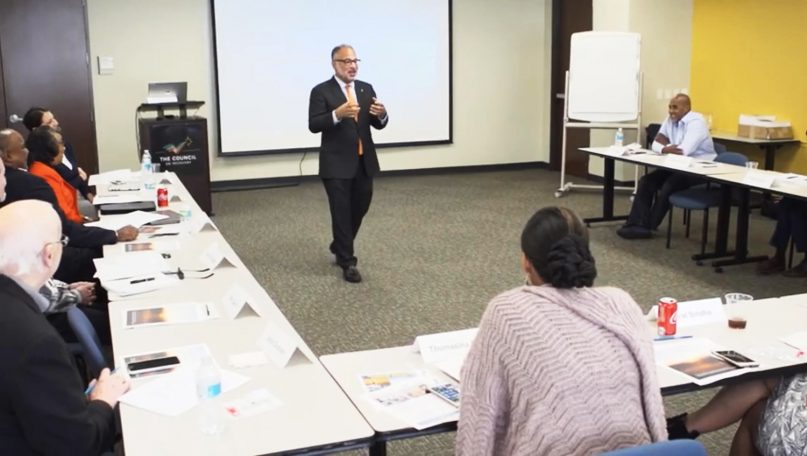(RNS) — For nearly a decade, the Clinton Foundation has been assembling a grassroots network of clergy of different faiths to counter the opioid crisis based on the notion that priests, ministers, rabbis and imams are the best messengers of both information and hope.
Some 150 priests, ministers, rabbis and imams in Houston, Jacksonville, Little Rock and other mostly Southern cities have been educated using the foundation’s year-long curriculum in the emotionally demanding work of supporting substance abusers and their families through treatment and recovery. Those who have completed the course then recruit and teach others.
When vaccines appeared to fight the spread of COVID-19, said Christian Thrasher, the foundation’s senior director of substance use disorders and recovery, “we realized the same model as we used with persons with substance use disorders could be adapted for the vaccine.”
RELATED: Faith and the COVID-19 Vaccine
Besides often being the one person who talks to the whole community in rural areas, clergy are also trusted enough to negotiate between public health information and deeply held beliefs about the healing powers of faith and government intervention. “In Georgia, one house of worship often serves an entire rural town,” said Thrasher, who is based in Atlanta. “They go for hope, purpose and meaning.”
It’s especially important to reach clergy, Thrasher said, “whenever you have a public health issue that brings stigma” — which, in some places today, can mean the stigma of wearing masks, which politicians have “weaponized,” he said.
“We talk about faith leaders as the connector between public policy and individuals,” said Thrasher.
The difference is that, unlike the extended opioid campaign, getting out the word about the vaccine will have to be a sprint to be effective.”That day when there are going to be thousands of vaccine doses on shelves and no willing arms is coming soon,” said Thrasher. “We asked, ‘What can we do now?'”
Most immediately, the Clinton Foundation developed a set of talking points about the safety and effectiveness of the vaccine, which the foundation released Thursday (April 8) to its network and on its website.
Besides basic information about how the vaccine was developed, the document suggests helpful ways to discuss the vaccine, such as referring to the benefits of receiving the shot rather than the consequences of not doing so and talking about “medical researchers,” not “drug companies,” which might foster mistrust.
The goal, wrote Clinton Foundation vice chair Chelsea Clinton in introducing the talking points, is to “dispel any myths that might be discouraging them from getting their shot.”
But the ultimate goal of the effort is to give clergy themselves the confidence to talk to their flocks and preach about the vaccine from the pulpit.
While some experts worried early in the vaccination campaign that Black Americans would be most hesitant to receive the vaccine, the most recalcitrant population by some measures has been white evangelical Christians, about 45% of whom said they were not likely to get a COVID-19 shot.
RELATED: Washington taps pastors to overcome racial divide on vaccine
Some U.S. Catholic bishops have cautioned against receiving the Johnson & Johnson vaccine because of its associations with fetal tissue in testing or development. (The Vatican has encouraged Catholics to receive the shot.)
“Different sectors have different objections,” said Thrasher. “Some folks remember Tuskegee. Some mistrust the government. But our goal is not to get people to abandon what they believe.
“We need people to understand how the vaccine works,” said Thrasher. “Then it’s up to them to share with congregants.”





